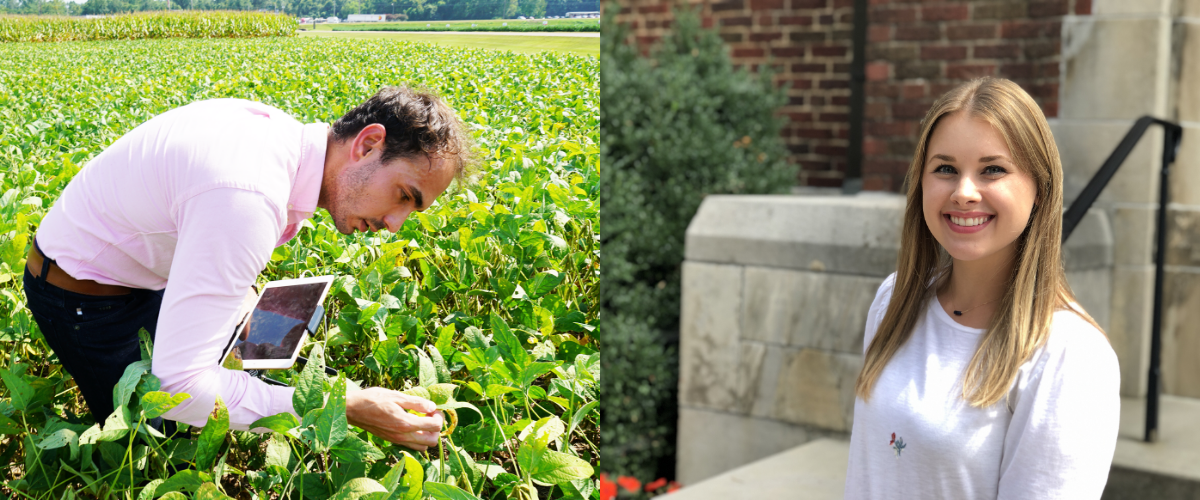
The Foundation for Food and Agriculture Research (FFAR) Fellows Program announced the 2023 cohort, which includes thirty fellows from colleges and universities across the country. Katy Smith and Elias Zuchelli, both PhD students in the Herbert College of Agriculture, were selected for this prestigious fellowship.
The FFAR Fellows Program is a three-year professional development training and development program for doctoral students studying food and agriculture sciences. Through this program, students not only form valuable connections within their cohort, but receive opportunities to network with leaders in the food and agriculture industries.
Smith, a PhD student in entomology and plant pathology, shared her reaction to receiving the fellowship. “Well, initially I was quite shocked, but then immense gratitude and excitement set in.” She continued, “Being chosen as a FFAR Fellow is such an important honor, and I’m thrilled to be one of the few students chosen to represent UT in this prestigious fellowship program.”
Zuchelli, also a PhD student in entomology and plant pathology with a concentration in sustainable disease and integrated pest management systems, was “very surprised.” Along with the mentorship he will receive, he’s most excited about connecting and sharing knowledge with the other cohorts.
Both Smith and Zuchelli applied for the fellowship for similar reasons. Smith mentioned the “invaluable opportunity to collaborate and interact with like-minded students,” as well as mentorship by industry, government, and other non-academic professionals. Zuchelli thought the fellowship would be a great way to engage with his peers and help him develop his confidence as a leader.
A crucial element of the fellowship involves research projects that reflect the program’s values. Smith explained, “My research aligns closely with the FFAR Advanced Animal Systems Challenge Area; specifically, by laying the foundation for the development of an integrated pest management (IPM) program for the economically important arthropod pests of beef cattle.” Through this program, she hopes to create “an accurate and producer approved pest surveillance method for beef cattle,” allowing producers to take a preventative approach to minimize reliance on chemicals and antibiotics.
Zuchelli’s project focuses on developing algorithms that predict disease occurrence and identify the most profitable and sustainable control method via flyover field assessment. “The development of such technologies will help to improve growers’ day to day activities, the quality of the products produced, and bring more sustainability to the production chain—the same goals that are shared by the FFAR.”
While Smith is still exploring career opportunities, she feels the FFAR Fellows Program contributes to her professional goals due to its emphasis on “developing leadership competencies, promoting multidisciplinary understanding and problem-solving, and broadening fellows’ understandings of career options.” She continued, “My ultimate career goal is to educate agriculturalists in sustainable production practices and empower them to make economically sound and safer operational decisions.”
Zuchelli’s ultimate goal is to “make farmers’ lives easier.” Like with his research, he hopes to use his knowledge and experience with the technical side of farming to create solutions to complex issues. Although he admits to being nervous about what the future holds, the FFAR Fellows Program now gives him an edge by guiding him through the process of determining his career path and giving him the tools he needs to get there.
Both Smith and Zuchelli credit the Herbert College of Agriculture for providing them with top-notch faculty mentors who have guided them in their research and made it possible for them to achieve the FFAR Fellowship.
Smith thanked her advisor, Becky Trout Fryxell, for “encouraging me to apply and for editing countless drafts of my application essay.” She also called out faculty members Karen DeLong and Wes Watson (retired faculty from North Carolina State University). “I cannot thank each of them enough for believing in my potential and submitting recommendation letters on my behalf.”
Additionally, Smith expressed her gratitude towards Deanna Jones from Corteva Agriscience for introducing her to entomology and convincing her “that insects are pretty cool.” She said, “I certainly wouldn’t be pursuing a PhD in entomology if I hadn’t witnessed the passion she shows for her career each day.”
Zuchelli specifically named his advisor, Heather Kelly, and Lesley Schumacher, both faculty members, thanking them for helping him choose “a project that has such a huge impact in the supply chain,” securing the funding needed for his research project, and helping him prepare for an opportunity like the FFAR Fellows Program. Zuchelli also gave a shoutout to his colleague, Autumn McLaughlin, stating, “she was very important during the process and encouraged me during my application.”
Smith’s closing sentiments toward the FFAR Fellows Program: “I’m immensely thankful to be chosen as a FFAR Fellow. This program has given me the opportunity to shine a spotlight on my research and the field of veterinary entomology, allowing me to communicate my science to a broader audience than I ever imagined possible.”
